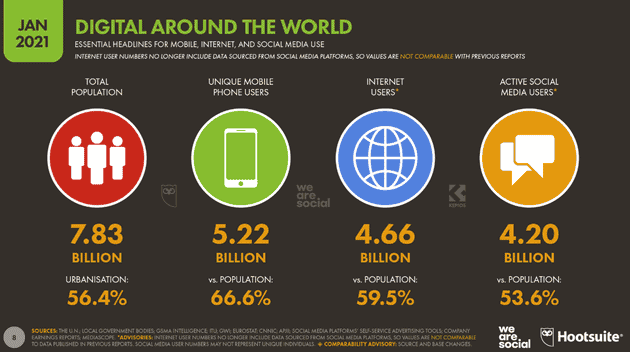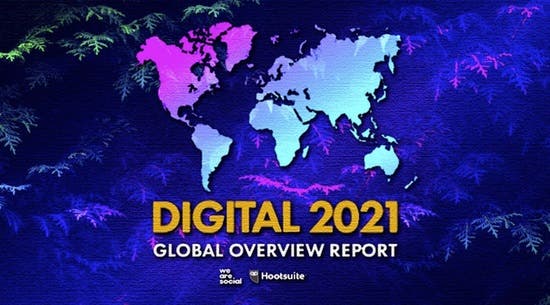Yesterday, we found an interesting report showing that as of January 2021, the number of global smartphone users was 5.22 billion; the number of Internet users was 4.66 billion; the number of social media users was 4.2 billion.
The report shows that as of January 2021, the world’s population is 7.83 billion. According to a UN report, this number is currently increasing at a rate of 1% per year. This means that since the beginning of 2020, the total global population has increased by more than 80 million people.
Also read: 55% Of Smartphone Users Keep Their Devices For 3-5 Years
Currently, 5.22 billion people worldwide use smartphones, equivalent to 66.6% of the world’s total population. Since January 2020, the number of smartphone users has increased by 1.8% (93 million), while the total number of mobile connections (one person owning multiple devices) has increased by 0.9% (72 million) to 8.02 billion (January this year).
In January 2021, the number of people using the Internet worldwide reached 4.66 billion, an increase of 316 million (7.3%) over the same period last year. Currently, the global Internet penetration rate is 59.5%. However, the COVID-19 outbreak has had a significant impact on the number of Internet users. So the actual number may be higher.

Currently, there are 4.2 billion social media users worldwide. This number has increased by 490 million in the past 12 months, a year-on-year increase of more than 13%. The number of social media users now accounts for more than 53% of the global population.
The popularity of social media has soared
The number of social media users has increased by more than 13% in the past year. By the beginning of 2021, there were nearly 500 million new users worldwide, bringing the total number of global users to nearly 4.2 billion.
In 2020, an average of more than 1.3 million new users join social media every day. This is equivalent to approximately 155,000 new users per second.
For the average social media user, they spend 2 hours and 25 minutes on social media every day. In 2021, global social media users will spend 3.7 trillion hours on social media.
Filipinos are still the world’s largest social media consumers, using social platforms for an average of 4 hours and 15 minutes a day. This is a full half an hour longer than Colombians, who rank second.
In contrast, Japanese users spend less than an hour on social media a day. It is currently 51 minutes. But this is still an increase of 13% year-on-year.
Smartphones have become our first screen
App Annie data shows that Android users around the world use their phones for more than 4 hours a day. Overall, this means that Android users have used more than 3.5 trillion hours of smartphone use in the past 12 months.
In addition, App Annie’s 2021 state of mobile report also shows that people now spend more time on smartphones than TV.
Another data shows that for the average Internet user, the daily time spent on the smartphone is 3 hours and 39 minutes. In contrast, the total time they watched TV every day was 3 hours and 24 minutes. This means that the current Internet users spend about 7% longer on smartphones than watching TV.
Increase in internet time
In general, the average Internet users use the Internet on all devices for nearly 7 hours a day. This is equivalent to more than 48 hours of online time per week, that is, 2 days out of every 7 days are online.
Assuming that everyone’s average sleep time per day is between 7 and 8 hours, this means that about 42% of our waking lives are spent online. And the time we use the Internet is almost the same as the time we sleep.
If Internet usage remains at this level throughout 2021, Internet users worldwide will spend nearly 12 trillion hours online this year.
People from different countries spend a lot of time online. Filipinos spend the longest time online, averaging nearly 11 hours a day. Brazilians, Colombians and South Africans also stated that they spend an average of more than 10 hours online every day.
At the other end, Japanese people spend the least online, less than 4.5 hours a day. It is worth noting that this figure in China is also relatively low, with only 5 hours and 22 minutes a day. This is 1.5 hours less than the global average of 6 hours and 54 minutes.
Online search habits are changing
Traditional search engines are still indispensable. 98% of respondents said they use search engines every month. However, more than 70% of respondents also stated that they now use at least one tool a month instead of text-based search engines to find information online.
The voice interface is the most popular choice. 45% of global Internet users saying that they have used voice search or voice commands in the past 30 days.
At the same time, nearly one-third of Internet users worldwide also use image recognition tools on their smartphones every month. In Latin America and Southeast Asia, tools such as Pinterest Lens and Google Lens are highly used.
But in the ever-evolving search behavior, the most interesting trend may be the rise of social search. Approximately 45% of global Internet users now say that they turn to social networks when looking for information about the products or services they want to buy.
This number is even higher among young users. Users of Generation Z (people born in 1995 and 2009) said that they are more likely to search for brands on social media rather than on search engines.
Multi-device strategy is still essential
Today, smartphones account for 53% of the time spent online globally. But other devices still play an important role in our lives.
Data shows that 90% of Internet users surf the Internet via smartphones. But 2/3 of them also said that they use laptop or desktop computers to surf the Internet.
Of the web pages visited in December 2020, more than 40% were requested by web browsers running on laptops and desktops. However, this percentage dropped slightly compared to December 2019.
The rise of online groceries and e-commerce
Globally, among Internet users aged 16 to 64, nearly 77% said that they shop online every month.
Internet users in Indonesia are most likely to make e-commerce shopping, with more than 87% of respondents saying that they have purchased something online in the past month. On the other hand, only 57% of Internet users in Egypt stated that they had made online purchases in the past 30 days.
In 2020, fashion and beauty products accounted for the largest share of global B2C e-commerce revenue, exceeding US$665 billion.





